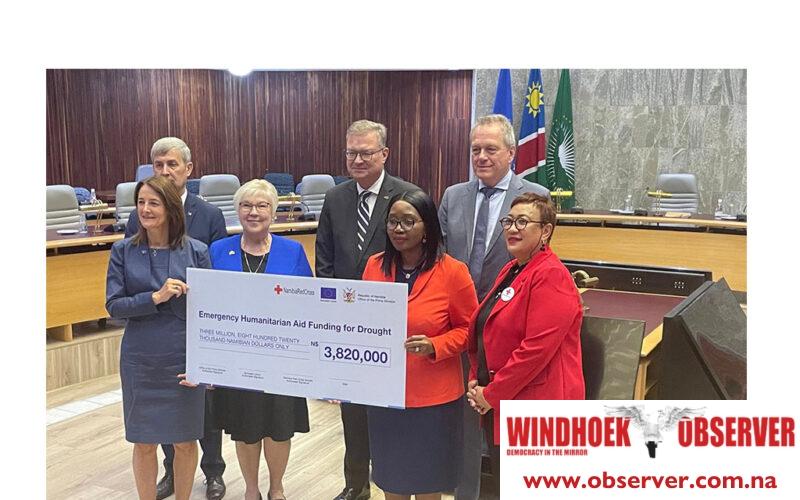Niël Terblanché
The European Union (EU) has donated approximately N$3.8 million to support Namibia’s ongoing drought relief programme in a gesture of international solidarity.
The announcement of the generous donation was made on Friday during a ceremony attended by Prime Minister Saara Kuugongelwa-Amadhila and EU Ambassador to Namibia, Ana Beatriz Martins.
Kuugongelwa-Amadhila expressed the Namibian government’s gratitude for the EU’s timely assistance, highlighting that the funds will be channelled through the Namibia Red Cross Society.
She said that the collaboration aims to provide essential aid, including food, clean water, and multipurpose cash, to over 140 000 individuals affected by drought in the Kavango West, Zambezi, Omusati, Ohangwena, and Kunene regions.
“The support we received from the European Union will go a long way in alleviating the immediate hardship faced by the most affected and vulnerable communities and boost our resilience-building efforts,” she said.
Ambassador Ana Beatriz Martins reaffirmed the EU’s commitment to supporting Namibia during this challenging period.
She stressed the importance of international cooperation in addressing climate-induced crises and expressed confidence in the Namibia Red Cross Society’s capacity to effectively implement the relief measures.
The EU’s contribution comes in response to the severe drought conditions that have plagued Namibia. On 22 May 2024, President Nangolo Mbumba declared a State of Emergency, recognising the drought as a national disaster.
Subsequent assessments revealed poor rainfall, diminished harvests, and increased vulnerabilities among communities nationwide.
In response, the Namibian government launched a comprehensive drought relief programme estimated to cost at least N$1.6 billion.
To date, N$800 million has been mobilised from international sources, leaving a funding gap of N$600 million.
As a result, the Namibian government appealed to development partners and the international community to bridge this shortfall.
The drought has had a profound impact on Namibia’s agriculture sector, straining water resources and leaving many households struggling to cope.
Regions such as Kunene have faced consecutive years of dire conditions, underscoring the urgency of sustained relief efforts.
The Namibia Red Cross Society, with its established community relationships and experience in implementing response interventions, including EU-funded climate adaptation projects, is poised to ensure that the support reaches the intended beneficiaries promptly.
Kuugongelwa-Amadhila said that the EU’s donation reiterates the importance of global partnerships in addressing environmental challenges and humanitarian crises.
“Such collaborations are vital in building resilience and safeguarding the livelihoods of vulnerable communities,” she added.




